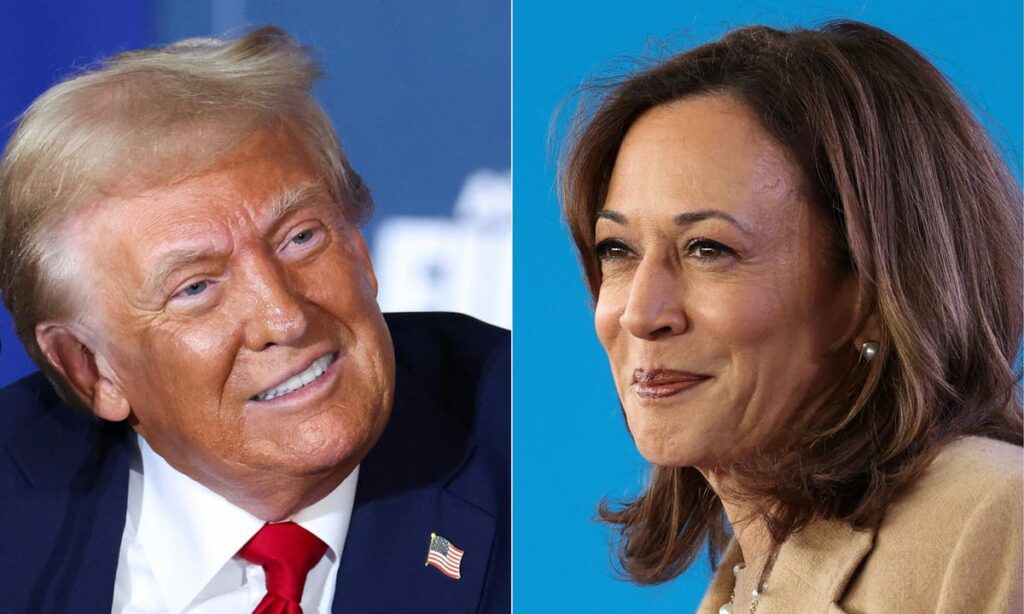Sign up for the daily Inside Washington email for exclusive US coverage and analysis sent to your inboxGet our free Inside Washington email
I was waiting outside the PNC Music Pavilion in Charlotte, North Carolina after Vice President Kamala Harris’s rally when my phone started to blow up. Ann Selzer, the vaunted pollster of Iowa, had just dropped a poll showing that Harris was leading Trump by three points in the Hawkeye State — a state Trump had won twice. Everyone in the political world wanted to talk about it.
The Trump campaign knew how bad this news looked. Tony Fabrizio and Tim Saler, the Trump campaign’s data men, released a memo challenging the findings almost immediately.
Not long afterwards, a New York Times/Siena College poll showed Harris leading in North Carolina, as well as Georgia, Nevada and Wisconsin. If Harris wins all four, she would not even need to win Pennsylvania, Arizona or Michigan in order to win the entire election.
By the time these polls dropped, I may have been shocked at their margin, but I was not surprised that Harris’s campaign had drawn another ace. That’s because I had spent much of Saturday following both presidential candidates around North Carolina on the final weekend of the campaign and it had become clear to me that Harris had all the momentum, while Trump was grasping for straws.
As I waited outside the pavilion for Harris’s rally, a few older white women worried they’d miss Harris speak. After the rally, another — Janice Lewis, who said she came from Davidson, North Carolina — told me that she not only was going to the rally but had already phone-banked for the vice president and had given money to Harris’s campaign.
This tracks with what the Selzer poll showed — particularly that senior women, meaning women aged 65 and older, support Harris by a whopping 2-to-1 margin. Many of these women remember life before Roe v Wade and were infuriated by the Dobbs v Jackson decision that killed it. Many also likely remember the wound that came with seeing Trump beat Hillary Clinton.
Before Trump took the stage at Gastonia Municipal Airport as part of a final weekend of campaigning, the billboards on both sides of the stage featured images of immigrants packing a hospital. “Kamala Harris promised free health care for illegals,” read the statement overlaid across the image. “They’re coming to collect.”
Another one showed a trash-ridden Haiti, with the statement “Kamala’s border plan: Make America Haiti”. In between that imagery, the interactive billboards would show Trump’s proposed pledges on no taxes on tips and Social Security.
To be sure, there was a long and winding line in the largely suburban county that featured huge Trump banners on many a front lawn. Some supporters were adorned in garbage bags. Many were raucous as the rally played clips ahead of his appearance at Wrestlemania and the packed audience did whip out their phones as Trump walked on to “God Bless the USA” by Lee Greenwood. But when he mentioned his proposal for no taxes on tips and got little response, he seemed aggravated.
“That’s not too good — do any of you work in restaurants?” he said. “ Because when I do that in Nevada, when I do that in Las Vegas, I say ‘no tax on tips,’ I have to stop the speech.” That was a telling moment.
Trump didn’t have as many surrogates in tow with him that day, either — surprising, considering how close to Election Day it was. (Mark Robinson, the embattled candidate for governor, has been all but been exiled by the Trump campaign, so that fact doesn’t help.) While two congressional candidates spoke, as did Republican National Committee Chairman Michael Whatley, the only other statewide candidate who joined Trump on the stage was Representative Dan Bishop, who will likely lose the race for attorney general to Democrat Jeff Jackson. Poor Hal Weatherman, the candidate for lieutenant governor, was relegated to shaking hands outside of the rally but didn’t speak.
At Harris’s rally in Charlotte later on the same day, plenty of women were wearing shirts emblazoned with the slogan “Childless Cat Lady.” One especially clever one (in my humble opinion) said: “It’s me, hi, I’m the cat lady it’s me” (a reference to Harris’s biggest celebrity endorsement, Taylor Swift.)
I arrived late to Harris’s speech, having been finishing up at Trump’s. But even as I was escorted to the press area, I could hear not only Harris’s booming voice, but also the crowd response to it. By the time I reached my seat, the crowd had jumped to their feet to give standing ovations a number of times.
Obviously, rallies are an imperfect barometer of a campaign’s momentum. Trump himself has frequently pointed to his rallies as a sign he is winning even when he is down in the polls. But the fact that the former president decided to go all in on North Carolina and spend three days rallying from Gastonia to Greensboro to Kinston to Raleigh showed he is sweating the state.
During the Democratic National Convention, Frank Luntz, the Republican pollster, referenced Sir Isaac Newton, saying that things in motion tend to stay in motion. The same can be said about Harris’s campaign. When I covered Harris’s rally with Walz in Arizona, the energy was electric — and now, across the country in Charlotte, that electricity seemed to show no signs of petering out.
As I waited for my bus to come in late in the evening in Charlotte, I noticed another sign: someone at the station was watching Harris’s speech on his phone.
Source link : http://www.bing.com/news/apiclick.aspx?ref=FexRss&aid=&tid=672e5abf80984b5c83346159e717fed6&url=https%3A%2F%2Fwww.independent.co.uk%2Fnews%2Fworld%2Famericas%2Fus-politics%2Ftrump-harris-north-carolina-election-2024-b2641003.html&c=14565358775615748121&mkt=en-us
Author :
Publish date : 2024-11-04 18:16:00
Copyright for syndicated content belongs to the linked Source.
